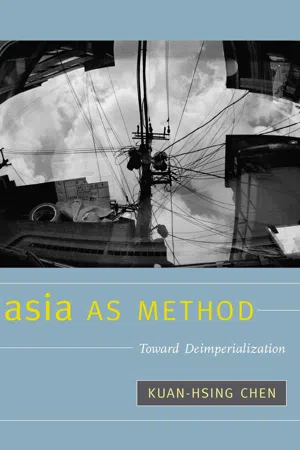
- English
- PDF
- Available on iOS & Android
eBook - PDF
About this book
Centering his analysis in the dynamic forces of modern East Asian history, Kuan-Hsing Chen recasts cultural studies as a politically urgent global endeavor. He argues that the intellectual and subjective work of decolonization begun across East Asia after the Second World War was stalled by the cold war. At the same time, the work of deimperialization became impossible to imagine in imperial centers such as Japan and the United States. Chen contends that it is now necessary to resume those tasks, and that decolonization, deimperialization, and an intellectual undoing of the cold war must proceed simultaneously. Combining postcolonial studies, globalization studies, and the emerging field of "Asian studies in Asia," he insists that those on both sides of the imperial divide must assess the conduct, motives, and consequences of imperial histories.
Chen is one of the most important intellectuals working in East Asia today; his writing has been influential in Taiwan, South Korea, Hong Kong, Japan, Singapore, and mainland China for the past fifteen years. As a founding member of the Inter-Asia Cultural Studies Society and its journal, he has helped to initiate change in the dynamics and intellectual orientation of the region, building a network that has facilitated inter-Asian connections. Asia as Method encapsulates Chen's vision and activities within the increasingly "inter-referencing" East Asian intellectual community and charts necessary new directions for cultural studies.
Tools to learn more effectively

Saving Books

Keyword Search

Annotating Text

Listen to it instead
Information
Publisher
Duke University Press BooksYear
2010Print ISBN
9780822346760, 9780822346647eBook ISBN
9780822391692Table of contents
- Contents
- Preface
- Introduction: Globalization and Deimperialization
- 1. The Imperialist Eye: The Discourse of the Southward Advance and the Subimperial Imaginary
- 2. Decolonization: A Geocolonial Historical Materialism
- 3. De–Cold War: The Im/possibility of "Great Reconciliation"
- 4. Deimperialization: Club 51 and the Imperialist Assumption of Democracy
- 5. Asia as Method: Overcoming the Present Conditions of Knowledge Production
- Epilogue: The Imperial Order of Things, or Notes on Han Chinese Racism
- Notes
- Special Terms
- Bibliography
- Index
Frequently asked questions
Yes, you can cancel anytime from the Subscription tab in your account settings on the Perlego website. Your subscription will stay active until the end of your current billing period. Learn how to cancel your subscription
No, books cannot be downloaded as external files, such as PDFs, for use outside of Perlego. However, you can download books within the Perlego app for offline reading on mobile or tablet. Learn how to download books offline
Perlego offers two plans: Essential and Complete
- Essential is ideal for learners and professionals who enjoy exploring a wide range of subjects. Access the Essential Library with 800,000+ trusted titles and best-sellers across business, personal growth, and the humanities. Includes unlimited reading time and Standard Read Aloud voice.
- Complete: Perfect for advanced learners and researchers needing full, unrestricted access. Unlock 1.4M+ books across hundreds of subjects, including academic and specialized titles. The Complete Plan also includes advanced features like Premium Read Aloud and Research Assistant.
We are an online textbook subscription service, where you can get access to an entire online library for less than the price of a single book per month. With over 1 million books across 990+ topics, we’ve got you covered! Learn about our mission
Look out for the read-aloud symbol on your next book to see if you can listen to it. The read-aloud tool reads text aloud for you, highlighting the text as it is being read. You can pause it, speed it up and slow it down. Learn more about Read Aloud
Yes! You can use the Perlego app on both iOS and Android devices to read anytime, anywhere — even offline. Perfect for commutes or when you’re on the go.
Please note we cannot support devices running on iOS 13 and Android 7 or earlier. Learn more about using the app
Please note we cannot support devices running on iOS 13 and Android 7 or earlier. Learn more about using the app
Yes, you can access Asia as Method by Kuan-Hsing Chen in PDF and/or ePUB format, as well as other popular books in History & Asian History. We have over one million books available in our catalogue for you to explore.